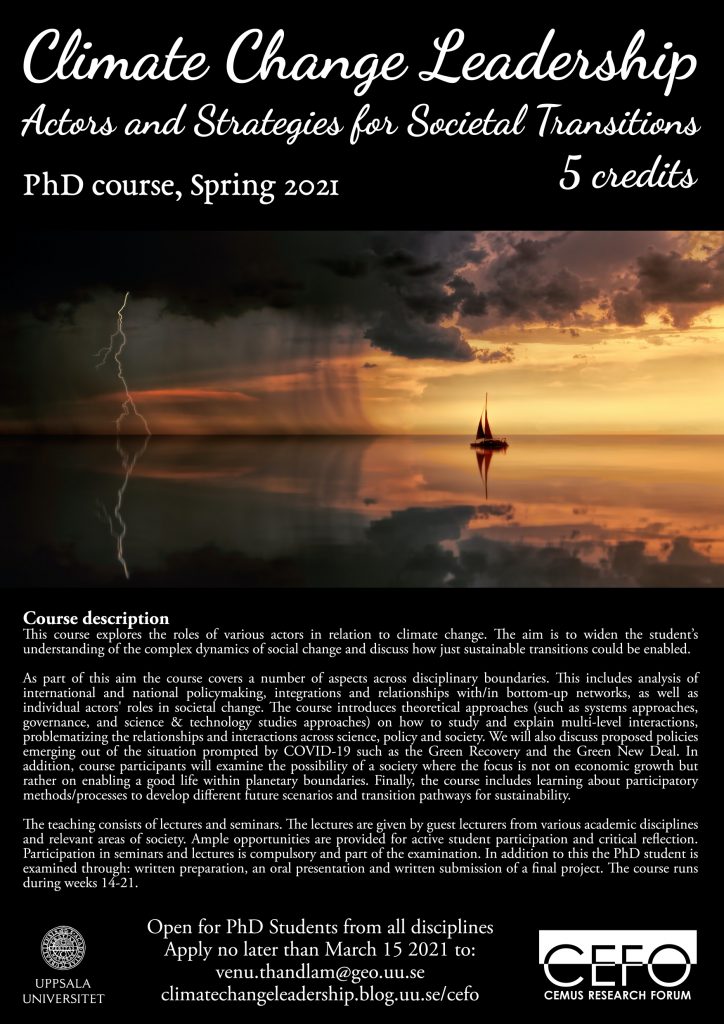
If you would like to find out more or apply to this course please email course coordinator Venu Thandlam at venu.thandlam@geo.uu.se

If you would like to find out more or apply to this course please email course coordinator Venu Thandlam at venu.thandlam@geo.uu.se
Watch Zennström Professor in Climate Change Leadership 2019 – 2020, Dr. Keri Facer deliver her inaugural lecture on the futures of universities in a changing climate.
Follow our youtube channel for talks and events with the Climate Change Leadership initiative at Uppsala University. Follow the CEMUS youtube channel for associated talks and events.
Find resources and reports for climate justice and Just Transition here.
Find resources and reports for the Swedish Carbon Budget work here.
Find resources and reports for the work on universities and education here.
Föreläsning: ”Laggards or leaders (bromskloss eller ledare); Paris, 2°C & the role for Sweden” av Kevin Anderson. Den hölls på Hotel Lysekil den 9 mars och publik var människor som hade samlats för att protestera mot Preems utbyggnad av oljeraffinaderiet i Lysekil. Dagen efter deltog Kevin Anderson som vittne i Mark- och miljööverdomstolens förhandlingar om Preems ansökan om utbyggnad. Mars 2020.
Seminarium: Fossilfri välfärd och negativa utsläpp – vision, kollision eller tomma ord? Den 11 februari 2020 samlades forskare och beslutsfattare för att ta sig an dessa två centrala idéer i den aktuella klimatpolitiken: fossilfri välfärd och negativa utsläpp. Isak Stoddard, doktorand hos CCL och NRHU, var med i panel diskussionen.
Report: Internationalisation and Sustainability The report below provides a brief exploration of the relationship between internationalisation and sustainability agendas in the contemporary university. It reports on a short programme of desk research by the team and a workshop bringing together university leadership, students, faculty and administrative staff. It identifies key tensions, possibilities, and routes towards achieving more sustainable internationalisation strategies in universities. The report has been compiled rapidly to respond to current debates and is intended as the basis for wider discussion.
Transforming Universities for the Future keynote lecture by Keri Facer at the International Association of Universities Conference. December 2019.
En koldioxidbudget för Umeå: Vår del av Paris avtalet. Med Aaron Tuckey och Martin Wetterstedt. October 2019.
Watch Professor Keri Facer’s inaugural lecture on Renewing the European University’s Mission in a Changing Climate. An early version of the text of this talk is also available here. October 2019.
Universitetens roll för en hållbar värld – omvärldens förväntningar. Almedalen lecture and panel discussion with Keri Facer, Göran Enander, Ingrid Petersson, Matilda Strömberg, Lotta Ljungqvist, and Carl Johan Sundberg. July 2019.
Climate vision – what is the role of universities in combating climate change? Almedalen panel hosted by Keri Facer with Eva Åkesson, Emma Nohrén, and Matilda Ernkrans. July 2019.
Climate change leadership – perspectives from science, industry and politics. Almedalen panel hosted by Keri Facer with Anna Rutgersson, Åsa Wikforss, John Hassler, Klas Palm, and Kristina Persson. July 2019.
Four-part interview with Keri Facer, on the role of the future, the richness of the meanwhile, and desirable futures at the Constructing Social Futures Conference 2019 for Futuuri magazine. June 2019.
Sustainability Talk on Campus Gotland, Uppsala University by Keri Facer. Building a University for the Common Good. March 2019.
Watch a short film: Professor Kevin Anderson on Living within our carbon budget: the role of politics, technology and personal action
A Democracy Now! broadcast with Kevin Anderson: World’s Richest Must Radically Change Lifestyles to Prevent Global Catastrophe. From the United Nations Climate Summit in Katowice, Poland. December 2018.
Sweden’s carbon budget challenge – turning Paris’ aspirations into local climate action Part 1 and Part 2. A lecture and panel discussion with Kevin Anderson, Agneta Green, Anders Wijkman, and Karin Sundby. July 2018.
The Swedish Carbon Cycle 2018 with Kevin Anderson.
From Paris to Sweden: 2° C, integrity, and the climate law, Kevin Anderson talk in Halmstad. June 2018.
ClimateExistence Conference: The Science, Politics and Culture of Climate Change – Beyond a Climate of Fear by Kevin Anderson followed by a dialogue between Vanessa Andreotti, Jens Holm, Anja Fjellgren Walkeapaa and Kevin Anderson, hosted by Sanna Gunnarsson, intervention by Klimatriksdagen. May 2018.
Kevin Anderson on Climate change and the need to change behaviour in the West. Research and the Sustainable Development Goals at the Danish Institute for International Studies. 26 April 2018.
Kevin Anderson on Climate change and economic growth: Can they be managed together? From Klimatriksdagen seminarium. February 6, 2018.
Kort intervju: Kevin Anderson om flygets utsläpp och alternativa fakta. February 2018.
Kevin Anderson: Revealing the naked emperor – Paris, 2° & carbon budgets. Talk at SR and SVT-event, November 2017.
A Democracy Now! broadcast with Kevin Anderson: Our Socio-Economic Paradigm Is Incompatible With Climate Change Objectives. From the United Nations Climate Summit in Bonn, Germany. November 2017.
Quit the loose climate talk and let’s get serious! A talk between Kevin Anderson and Hugh Hunt. Climate Matters show live from COP-23 in Bonn, Germany. November 2017.
Kevin Anderson discusses negative emissions at UNFCCC with Glen Peters, Corinne Le Quéré, and Youba Sokona. November 2017.
Kevin Anderson and Isak Stoddard on Carbon Budget and Pathways to a fossil free future in Järfälla Kommun. October 25, 2017.
Podcast: Transition for beginners – How not to fly with Kevin Anderson, Radio Luftbalett, October 27, 2017.
Leader or Laggard? Reviewing Sweden’s climate and sustainability agenda . A lecture and panel discussion from Almedalen 2017 with Kevin Anderson, Ranjula Bali Swain, Hanna Hansson, and Erik Westholm.
Are universities making the world worse? Education and research in an age of climate change . A panel discussion from Almedalen 2017 with Kevin Anderson, Josefin Wangel Weithz, and Johanna van Schaik Dernfalk.
Sustainable development dilemma – why are facts not enough to convince? A panel discussion with Kevin Anderson, Henrik Hamrén, Maria Osbeck, and Anna Rudels from Almedalen 2017.
Climate Catastrophe or Societal Transition – What is Needed of Politicians and Individuals? An interview with Kevin Anderson and Stigbjörn Ljunggren. Almedalen 2017.
Courage and Climate: An Interview with Kevin Anderson. Interviewed by Paul Campion and Stephen Tuscher, students at the Newman Institute, for Civic Courage in Theory and Practice, a course taught by Brian Palmer. November 2016.
Climate Change: A Parisian Tale of Triumph and Tragedy. Uppsala University Lecture in Climate Change Leadership August 2016 with Kevin Anderson.
Education, Sustainable Development and the Challenges of Climate Change . CEMUS Spring Semester Introduction lecture 2016 with Professor Doreen Stabinsky.
Sister’s Academy develops new art-based research methods to collect data. Based in Denmark.
Emergence Network is a research inquiry into the otherwise via practices that trouble the traditional boundaries of agency and possibility.
Climate and Mind explores the relationship between climate disruption, human behaviour, and human experience.
Bifrost is an environmental humanities intervention on climate change bridging nature and culture, science and art, understanding and action, challenges and solutions.
Gesturing towards decolonial futures is a portfolio of artistic, pedagogical and cartographic experiments that seek to not only imagine but also enact the world differently.
Ecoversities network explores what the university might look like if it were at the service of our diverse ecologies, cultures, economies, spiritualities and Life within our planetary home.
Dark Mountain is a radical project looking for other stories that can help us make sense of a time of disruption and uncertainty.
This is a set of quick links to some of our work on Universities, Schools, Education in general and Climate Change
Universities and Climate Change
Zennström Professor Keri Facer’s Inaugural Lecture on ‘Learning to live with a lively planet: renewing the mission of the research university’
A report from the Initiative on Internationalisation and Sustainability – is it possible to square these two agendas?
A keynote from Keri Facer on Universities and the SDGs to the Transforming Higher Education for the Future (IAU) Conference in Puebla, Mexico, November 2019
A public debate on cities and climate change, with Richard Florida, at KTH Stockholm. Keri joined the panel to reflect on the climate implications of Florida’s proposals.
A public debate on universities and climate change – at Almedalen, with Professor Keri Facer, the Minister for Higher Education Matilda Ernkrans, Uppsala University Vice Chancellor Professor Eva Åkesson and the lead for Sweden’s Environment agenda, Dr Emma Nohrén.
A public debate on the role of science, industry and government in addressing climate change.
In Swedish – Universitetens roll för en hållbar värld – a public debate at Almedalen with Uppsala universitet, SLU, Karolinska institutet, Stockholms universitet, Handelshögskolan i Stockholm, KTH
What are the links beteween climate change and civic university agendas? A short post for the UK’s Higher Education Policy Institute
University Innovation Agendas – AIM Days and climate change – a report from Laila Mendy.
What sort of knowledge do we need to think about long term futures? Science and Futures in Government. A talk by Dr Claire Craig.
Are universities making the world worse? Education and research in an age of climate change . A panel discussion from Almedalen 2017 with Kevin Anderson, Josefin Wangel Weithz, and Johanna van Schaik Dernfalk.
General Education and Climate Change
A report from the Transforming Education for Sustainable Futures programme, led by Professor Keri Facer, which makes recommendations on Education and Climate Change
Four-part interview with Keri Facer, on the role of the future, the richness of the meanwhile, and desirable futures at the Constructing Social Futures Conference 2019 for Futuuri magazine. June 2019.
Education, Sustainable Development and the Challenges of Climate Change . CEMUS Spring Semester Introduction lecture 2016 with Professor Doreen Stabinsky.
Popular and Public Education
A report on the important role of transformative public education – public, dialogic, collaborative, transgressive – in addressing Covid-19, with implications also for climate change.
A report on a Legacy 17 workshop – a popular education strategy for addressing questions of sustainability.
Leading activity within Uppsala University
We have been working over the last year with the 2050 plan for the University Campus, supporting long term thinking about the link between climate change and university campuses. This includes events and consultation workshops.
Sustainability Talk on Campus Gotland, Uppsala University by Keri Facer. Building a University for the Common Good. March 2019.
Vad är en koldioxidbudget?
Den globala koldioxidbudgeten är den begränsade totala mängd koldioxid, det utsläppsutrymme, som kan släppas ut till atmosfären för att klara ett visst temperaturmål. Den kan brytas ner och fördelas i tid och rum och därigenom uttryckas som lokala årliga koldioxidbudgetar.
En koldioxidbudget är förstås den siffra, den mängd koldioxid, samt tillhörande förslag på minskningstakt för att klara denna. Men budgeten består också av de tolkningar av vad Parisavtalet innebär och möjligheten till så kallade negativa utsläpp. I sig hjälper den till att konkretisera vad det innebär att koldioxid ackumuleras i atmosfären, och att CO2‑utsläpp därför måste betraktas ur ett kumulativt perspektiv.
Det är detta arbete som gjorts i detta projekt för svenska kommuner, regioner och län för åren 2020-2040. Efter 2040 måste utsläppen fortsätta att sjunka mot noll.

Om samarbetet med svenska kommuner, regioner och län
Kevin Anderson är pionjär inom arbetet med att omvandla den globala koldioxidbudgeten till nationell och lokal nivå och har bland annat tagit fram en budget för Manchester, Skottland samt för England via deras Climate Change Act.
År 2017 tog Järfälla kommun kontakt med klimatledarskapsnoden (CCL) och undrade om Järfälla kunde få en koldioxidbudget beräknad (Anderson et al., 2017). När projektet var klart tog fler kommuner samt län kontakt med CCL och bad att få budgetar beräknade.
Det stora intresset resulterade i att det under 2018 startades ett projekt, Koldioxidbudgetar 2020-2040, för att beräkna budgetar åt fler kommuner, regioner och län. Framförallt under upplaga två, men även under de senaste omgångarna dialog förts med deltagande organisationer via mail och möten. Mötena har syftat till att behovsanpassa innehållet i rapporterna samt att författarna får ta del av kommunala och regionala perspektiv, kunskaper och erfarenheter.
Sammanlagt har vi nu beräknat koldioxidbudgetar för ett tjugotal kommuner, regioner och län runt om i Sverige
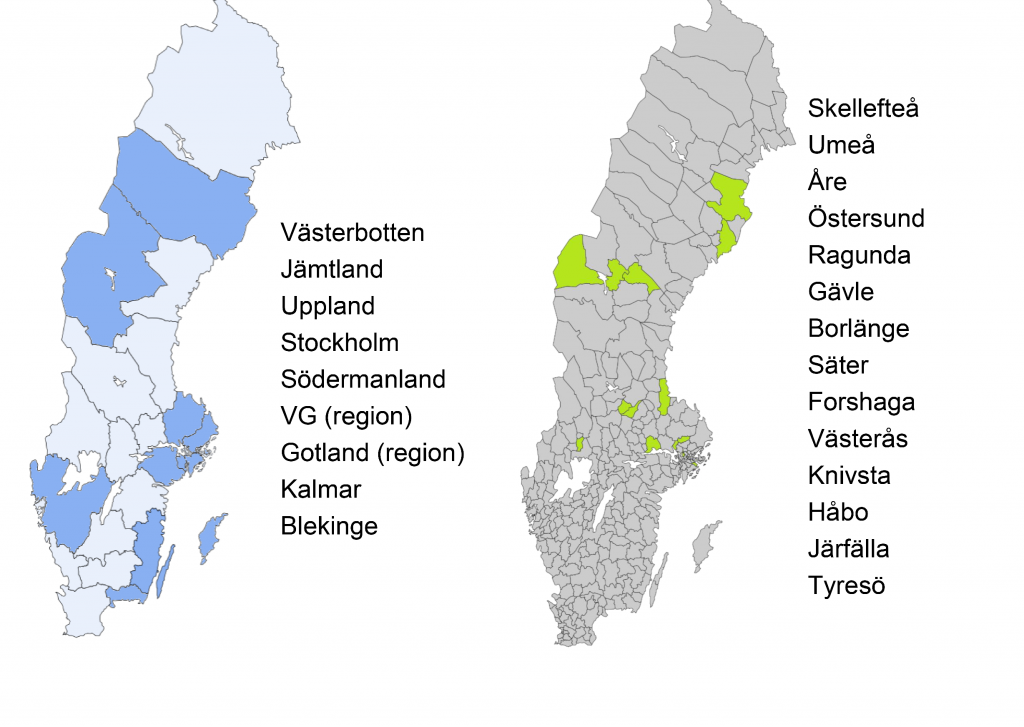
Pågående arbete
Just nu planerar vi för 2021 års arbete, ta gärna kontakt med oss om ni är intresserade att delta.
Som inspiration kan nämnas att EU just röstat igenom att koldioxidbudgetar ska användas samt att staden Manchester i England har antagit följande ambitiösa mål:
Under 2018-2019 pågår också ett Vinnovaprojekt med titeln – Digital plattform för beräkning av koldioxidbudgetar och simulering samt sam-skapande av klimatåtgärdspaket – ta gärna kontakt med oss om det låter intressant.
CEFO is a research forum for PhD students, by PhD students, focused on facilitating interdisciplinary discussions around sustainability and environmental change. Our main activities include running a bi-monthly seminar series featuring talks and workshops from CEFO members and invited speakers. We initiate and run student-led PhD courses and offer opportunities for getting feedback for your research from a wider audience. Seminars, workshops and events are open to any interested PhD students, researchers, masters students and interested public.
Climate Change Leadership PhD courses
These courses give a broad orientation of theories and concepts within the emerging climate change leadership field focusing on how to engender a rapid social transition to zero emissions. The main focus lies on analysing how theories and concepts of climate change leadership, stemming from political and social sciences, systems thinking, governance theory and societal planning can be used to understand and shape transitions.
The internationally recognised Zennström Professors in Climate Change Leadership work with academics, students, civil society and public and private partners to understand the scale of the transition needed to mitigate and adapt to climate change, and begin to develop routes towards these transitions. To date we have had four Zennström Professors.
STEFANIA BARCA – ZENNSTRÖM VISITING PROFESSOR 2021 – 2022
We are delighted to welcome Stefania Barca as our next Zennström Professor in Climate Change Leadership. Stefania is a scholar in Environmental Humanities, with a strong commitment to environmental and climate justice.
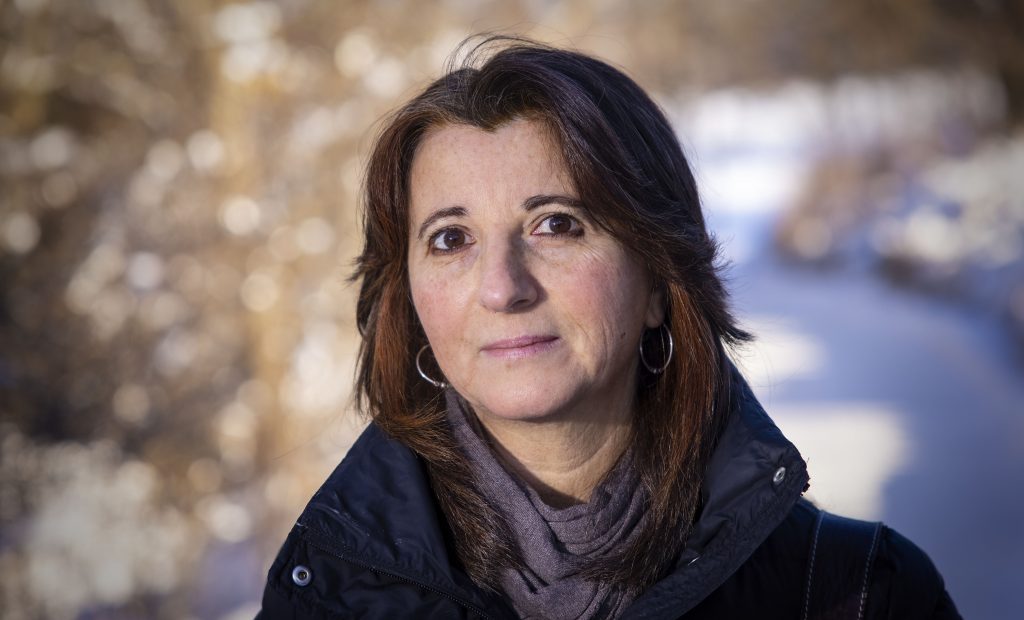
During her time in Uppsala she will be building on the legacies left by the previous professors, as well as facilitating new initiatives around the Covid-19, climate and care nexus. In particular Stefania looks forward to actively contributing to the convergence of labour, feminist, youth and climate justice organisations towards a politics of Just Transition.
Stefania will begin her time in Uppsala with with a series of events with academics, practitioners and activists, exploring emergent themes stemming from such creative and participatory conversations. Her professorship will culminate in a conference on Just Transition in spring 2022, the first of this kind in Europe.
contact: stefania.barca@geo.uu.se
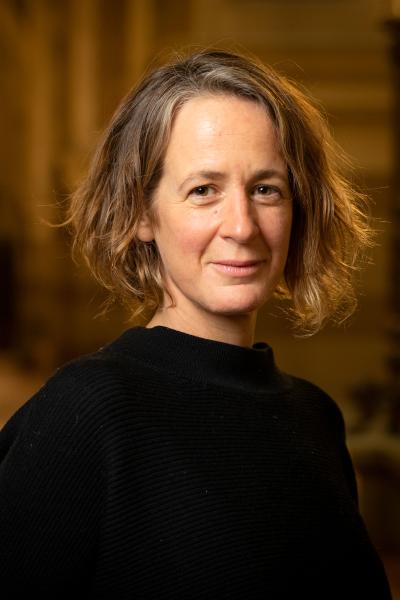
Keri Facer is Professor of Educational and Social Futures at the University of Bristol, School of Education. She works on rethinking the relationship between formal educational institutions and wider society and is particularly concerned with the sorts of knowledge that may be needed to address contemporary environmental, economic, social, and technological changes.
Since 2013, Keri has been Leadership Fellow for the RCUK Connected Communities Programme. This research programme is creating new relationships between communities and universities, drawing on arts and humanities perspectives and methods to enable new forms of knowledge production to address urgent contemporary issues.
Keri’s aim is to work across the whole of Uppsala University to explore how universities can build partnerships with local, national, and international communities, how we can develop powerful knowledge, and how we can educate students to enable the massive transitions we need to live well with climate change.
Contact: keri.facer@geo.uu.se
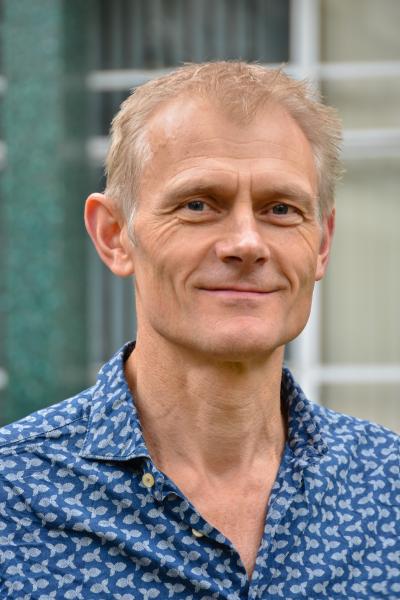
Kevin Anderson is one of the leading climate scientists in the U.K. He is Professor of Energy and Climate Change at the University of Manchester and Deputy Director at the renowned Tyndall Centre for Climate Change Research.
Kevin is a well-known and established researcher within climate change science who engages frequently with policy-makers, the private sector, civil society as well as the media. He has pioneered research on carbon budgets and pathways to acceptable mitigation levels. His work on the technical, social and economic interactions involved in the transformation of energy systems and the mitigation and adaptation to climate change, addresses questions at the core of this professorship’s theme.
Kevin is a prominent thinker, writer and communicator who built on and expanded the work of the first visiting professor in Climate Change Leadership, Doreen Stabinsky.
Contact: kevin.anderson@ccl.uu.se
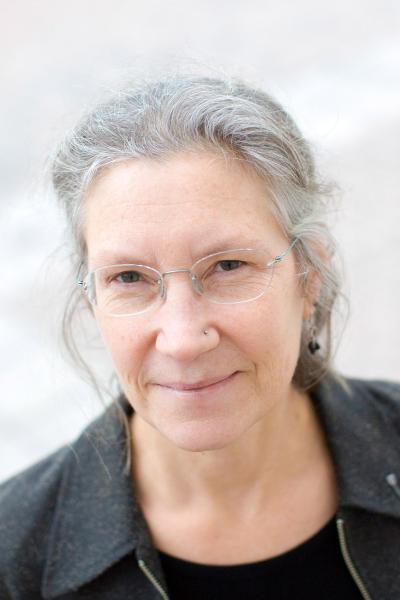
Doreen Stabinsky is Professor of Global Environmental Politics at the College of the Atlantic in Bar Harbor, Maine. Her research, teaching, and writing concern the impacts of climate change, particularly on agriculture and global food security. She also serves as advisor to various governments and international environmental organisations, and has a large international network of collaborators.
Doreen stresses the central role that education must play in addressing the growing challenges of climate change and is known for her ability to strengthen young people’s capacity to contribute to a better world. The fact that the focus of the professorship itself was inspired by, and emerged from a student-led course on Climate Change Leadership at CEMUS, made Doreen a fitting first holder of the Zennström Visiting Professorship.
Contact: doreen.stabinsky@ccl.uu.se
The Zennström Climate Change Leadership visiting professorship acts as a catalyst for public debate, research and education to directly address some of the most challenging questions that climate change poses to humanity. Since 2015 four Zennström Professors in Climate Change Leadership have been working with academics, students, civil society and public and private partners to both understand the scale of the civilisational transition needed to mitigate and adapt to climate change and to begin to develop routes towards that transition and prepare for adaptation.
Our current projects largely fall within four areas built upon the research themes of the Chairs of the Zennström professorship. These include:
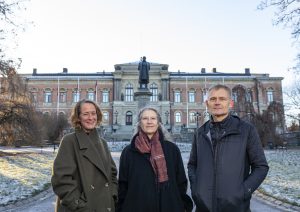
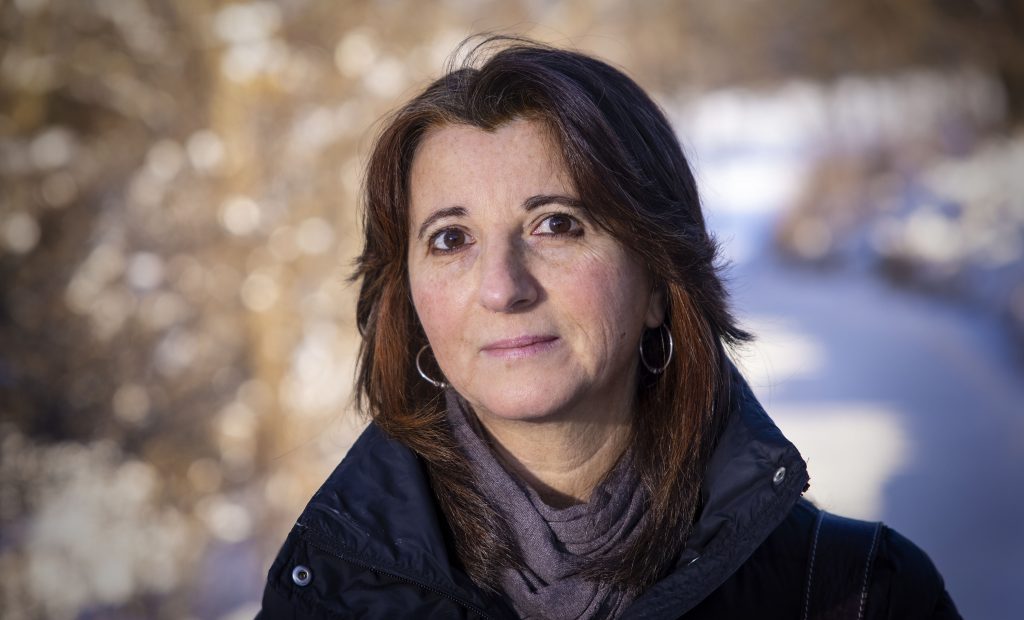
Climate change leadership is a dynamic field, crossing disciplinary and societal boundaries, with the aim to catalyse innovative and bold approaches to meet the complex challenges of climate change. This dynamism and energy is derived from the increasing demand for knowledge and practices to meet challenges across all sectors of society, from the local to international level. Climate change leadership is characterised by knowledge co-production between academia and society at large, to ensure effective and just institutional and socio-technological transformations.
The overall goal of the initiative is to actively shape an inter- and transdisciplinary intellectual environment that combines education, research and outreach in innovative ways and applies knowledge into equitable climate action. The climate change leadership environment engages with new forms of vibrant, trans- disciplinary and exploratory forums with world-leading climate scientists, key climate negotiators, business and civil society leaders, policy-makers, social entrepreneurs and, not least, students and young leaders.
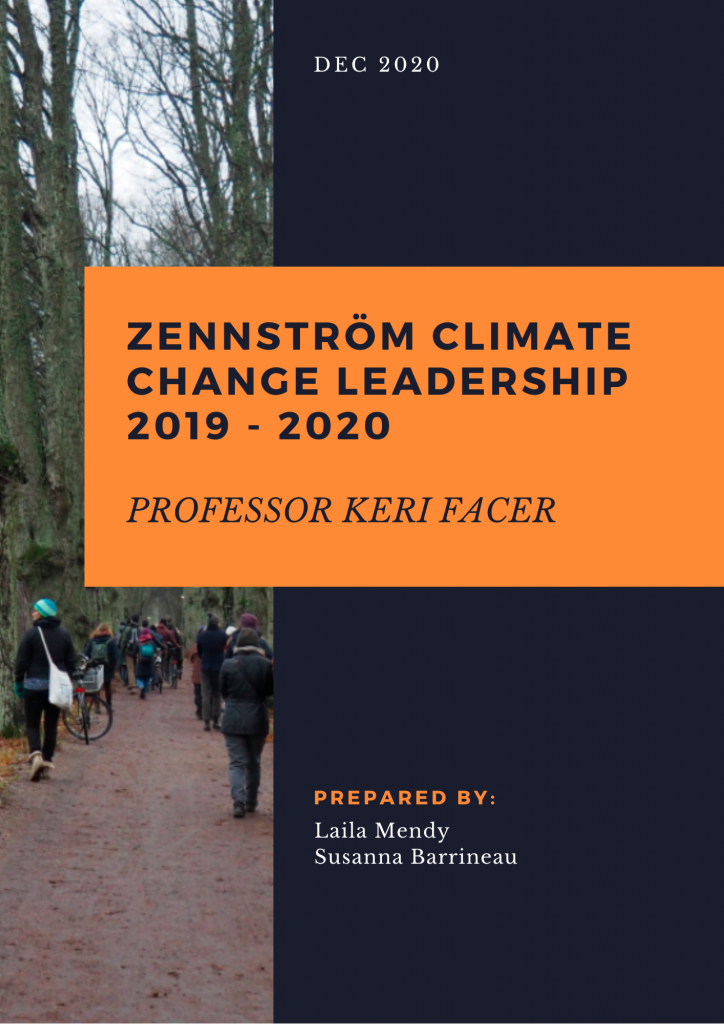
In this report we summarise the activities of professor Keri Facer, the third Zennström professor of Climate Change Leadership at Uppsala University. This report is written in English.
I denna rapport sammanfattar vi aktiviteterna under perioden 2018 – 2020 med professor Keri Facer, den tredje Zennström professorn i klimatledarskap vid Uppsala universitet. Denna rapport är skriven på engelska.

On the 17th of November the Cemus research Forum had the pleasure of welcoming Bregje van Veelen. She gave a talk about the emergent imaginary of the ‘plyscraper, which is available below:
Bregje summarizes the talk as follows:
Climate governance must be a project of not only regulatory undertaking, but also of deep-rooted societal and spatial (re)imagination. But how do we re-imagine our world, who is involved, and what is left out? In this presentation, I explore these questions in relation to a still underexplored front of climate action: proposals for a revolution in low-carbon materials, that seek to establish a 21st century bio–economy. Specifically, I will do this through the emergent imaginary of the ‘plyscraper’, which put timber skyscrapers at the heart of the vision for low-carbon living of the future. While the use of wood in construction has long been practiced (as evidenced by the red timber houses that dot the Swedish country side), what makes the new timber imaginary different is that it positions itself as distinctly urban and modern. But how ‘green’ is it? How does the imaginary establish timber’s green qualities and with what effect? By exploring the jostling involved in bringing this imaginary into being, I consider a number of yet unresolved issues around establishing the green/low-carbon qualities of this new frontier of climate action, and the broader implications for climate governance
Helena Fornstedt, Coordinator CEMUS research Forum
On the 3rd of November Riccardo Mastini joined the CEMUS research Forum via zoom. He started off with a very appreciated talk followed by a nice and interesting discussion. The talk is available below:
Riccardo summarizes the talk as follows:
The emerging political discourse of the Green New Deal postulates the need for an active role of the State in the economy to drive the ecological transition by deploying the power of public investment and coordination. However, a truly transformative Green New Deal must also move beyond the ‘growth paradigm’ by decreasing energy and material use in affluent countries, decommodifying the basic necessities of life, and democratizing economic production. The paper, with the same name as the talk, is available here
Riccardo is a PhD Candidate at Institute of Environmental Science and Technology (ICTA), Autonomous University of Barcelona. He is a policy advisor for the international campaign Green New Deal for Europe. He is also a member of the academic collective Research & Degrowth and of the international network Wellbeing Economy Alliance. You can follow him on Twitter, Facebook, Youtube and LinkedIn.
Helena Fornstedt, Coordinator Cemus Research Forum
On the 20th of Oct 2020, Yacob Mulugetta had a seminar at the CEMUS research Forum, titled “Low carbon energy narratives and futures in Africa: Dissonant times?”. Mulugetta is Professor of Energy and Development Policy at University College in London and among many other things he was Coordinating Lead Author of the Energy Systems chapter of the Intergovernmental Panel on Climate Change (IPCC) 5th Assessment Report.
It was a very interesting talk and it raised many questions which led our discussions to last well into lunch. Professor Mulugetta’s talk is available here:
You also find his own summary of the talk below:
It is widely recognized that energy production and use is both a key reflection of the socio-economic landscape as well as a major driver of the climate challenge. Africa finds itself at the heart of a momentous global energy and climate conversation. The energy and development reality across the region evokes deep emotions about the importance of doing something about the scandal of energy poverty. As if this was not complex enough, there is a call for the region to chart out a new and responsible energy pathway: one that does not impact on the global climate system. To this end, numerous real world experiments are taking place across Africa on various ‘energy futures’ to simultaneously unlock local (and national) energy potentials and deal with major global challenges. What is also emerging is how ideas around the ‘energy-climate challenge’ play out is highly dependent on the multi-level political context and dynamics, and is thus deeply influenced by competing framings and narratives. These dominant and competing accounts, in turn, interact to shape the specific interventions and policies. This presentation/discussion will explore the dominant narratives that are shaping the African energy landscape, how these narratives are constructed and mobilized, and discuss ways to open alternative and energy possibilities that protect the wellbeing of poor communities and their climate. The talk will also sketch out the research and policy opportunities in this area.
Helena Fornstedt, Coordinator, CEMUS Research Forum

A new paper by Professor Kevin Anderson and NRHU doctoral student Isak Stoddard reviews the mitigation plans of “climate progressive” nations, Sweden and the UK, and compares them with Paris-compliant pathways, and is now published in Climate Policy. The piece is written together with a colleague from Manchester, John Broderick.
You can read the full article here:
Swedish press release from Uppsala University can be read here:
Sveriges klimatmål långt ifrån tillräckliga för att klara Parisavtalet
And a longer news piece/interview here.
You can even read a slightly more polemic piece in the Ecologist which expands a bit on the results of the analysis and is available here:
Beyond a climate of comfortable ignorance
For more information contact:
Isak Stoddard vid institutionen för geovetenskaper, Uppsala universitet
Tel: 070-3147236
E-post: isak.stoddard@geo.uu.se
Kevin Anderson vid institutionen för geovetenskaper, Uppsala universitet
Tel: +44 797 314 1376
E-post: kevin.anderson@ccl.uu.se
Follow this new network ‘Transforming Education for Sustainable Futures’ with which Zennström Professor Keri Facer is involved! Keep an eye out for postings soon about transformative public education in context of CV-19.
Here is the first briefing paper on The Case for Transformative Public Education with leading contribution from Professor Facer. This paper focuses on responding to COVID-19 now while addressing long-term underlying inequalities.
Blog post by Zennström Professor Keri Facer on the Higher Education Policy Institute addressing the UPP Foundation Civic University Commission’s recent report on how universities can successfully serve in the 21st century. Climate change was a glaring omission in this report, as Keri writes.
Read post here: https://www.hepi.ac.uk/2020/03/04/reconnecting-the-civic-university-with-the-climate-agenda-thinking-globally-acting-locally/
© 2026 Climate Change Leadership
Theme by Anders Norén — Up ↑